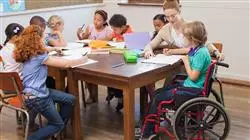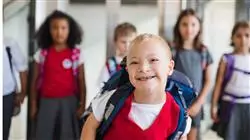University certificate
The world's largest faculty of education”
Description
The teaching professional must be prepared to deal with bullying in the classroom or child to parent violence. This professional master’s degree provides you with the tools and knowledge you need to deal with these situations"

Beyond the arduous task of teaching, the teaching professional lives with children and adolescents, who may be in a situation of social exclusion and who are surrounded by a series of problems that hinder their adequate physical and cognitive development. A scenario that requires knowledge that goes beyond the actual subject taught by the teacher and requires knowledge about psychological disorders, legal regulations applied in violent cases or the application of specific school mediation programs.
This knowledge has a direct impact on the students themselves and on the school climate in which they develop. The teaching professional, therefore, is a key member of the personnel to achieve the most optimal conditions in which learning can take place. In this sense, this professional master’s degree offers intensive learning with a comprehensive vision of inclusive education and social inclusion, especially for children and adolescents in situations of exclusion.
Through video summaries, detailed videos or specialized readings, the teacher will delve into the preparation of teachers for the inclusive school, the system of protection of minors, the educational environment in the face of a student under guardianship or the role of the family as part of the educational community. Likewise, the simulations of practical cases will serve to bring the teachers closer to situations that they will have to solve in their daily work.
A quality, advanced, flexible and ideal program for graduates who wish to advance in their professional careers by balancing a university education with work and/or personal responsibilities. Students immersed in this degree will only need a device with an internet connection to consult or download the syllabus whenever they wish. Teaching staff are therefore faced with a non-classroom teaching, with no class schedules and with the option of distributing the teaching load according to their needs.
The Relearning system applied by TECH in its programs reduces the long hours of study so frequent in other teaching methods"
This professional master’s degree in Inclusive Education for Children and Adolescents in Situations of Social Exclusion contains the most complete and up-to-date program on the market. The most important features of the program include:
- The development of case studies presented by experts in inclusive education for children and adolescents
- The graphic, schematic, and practical contents with which they are created, provide scientific and practical information on the disciplines that are essential for professional practice
- Practical exercises where self-assessment can be used to improve learning
- Its special emphasis on innovative methodologies
- Theoretical lessons, questions to the expert, debate forums on controversial topics, and individual reflection assignments
- Content that is accessible from any fixed or portable device with an Internet connection
Enroll and learn with this university degree to carry out actions focused on equality in your classroom"
It includes in its teaching staff professionals belonging to the field of inclusive education who bring to this training the experience of their work, in addition to recognized specialists belonging to reference societies and prestigious universities.
Thanks to its multimedia content developed with the latest educational technology, they will allow the professionals a situated and contextual learning, that is to say, a simulated environment that will provide an immersive learning programmed to train in real situations.
This program is designed around Problem-Based Learning, whereby the professional will must try to solve the different professional practice situations that arise during the course. For this purpose, the professional will be assisted by an innovative interactive video system developed by recognized experts in the field of inclusive education for children at risk of social exclusion and with extensive teaching experience.
This professional master’s degree is the most comprehensive knowledge on the system of protection of minors"

Sign up now and take action. Creates programs that respond to children and adolescents with Special Needs"
Objectives
This professional master’s degree is designed to specialize students in the attention and approach to young students who are in social exclusion, as well as in the creation of programs that favor inclusive education. To do so, teachers will have the essential educational tools to progress in this field, being up to date with the different techniques of intervention in difficult situations such as child abuse.

With this online program, you will delve into the most common psychological disorders in children and adolescents"
General Objectives
- Enable the student to teach in situations of risk of exclusion
- Define the main characteristics of inclusive education
- Manage techniques and strategies for the intervention with the diversity of students, as well as with the educational community: families and environment
- Analyze the role of teachers and families in the context of inclusive education
- Interpret all the elements and aspects concerning teacher preparation in the inclusive school
- Develop in students the capacity to elaborate their own methodology and work system
- Internalize the typology of students who are at risk and socially excluded, and how the educational system should respond to them
- Describe the functioning of the child and youth protection system
- Study the different types of protection measures and their treatment in the school environment
- Analyze situations of child abuse and the protocols for action by the psychology professional
- Identify the stages of development from birth to adolescence; allowing students to have their own judgment to establish the effects that cognitive, communicative, motor and emotional processes have on child development
- Detect risk factors of different nature that may alter development throughout the life cycle
- Describe the general circumstances of the students under guardianship and how these may affect their educational environment
- Learn how to respond to students under guardianship and their families in the school environment
- Apply mediation as a pedagogical tool for conflict resolution and harmonization of the educational community
Specific Objectives
Module 1. Inclusive Education and Social Inclusion
- Describe key concepts related to educational and social inclusion
- Explain the traditional methods of education
- Define key inclusive education methods
- Identify student needs
- Identify the needs and possibilities of the educational center
- Plan an educational response adapted to the needs
Module 2. Teacher Preparation for Inclusive Schools
- Describe the historical evolution of exclusivity in the classroom
- Interpret the main sources of inclusive scope
- Analyze the main components for teacher learning
- Instruct on different models of Inclusive Schooling
- Inform on legislation pertaining to inclusive education
- Use tools for learning in the field of exclusivity
- More effective interpretation of inclusive schooling
Module 3. The Role of the Family and the Community in Inclusive Schooling
- Define the types of families that exist
- Apply Techniques and Strategies for Intervention with the Diversity of Families
- Explain how to work with these families from the Inclusive School
- Give Guidelines to get families actively involved in the Educational Process of their children
- Analyze the Role of Society in the Inclusive School
- Describe the role of families in Learning Communities
- Develop the student's ability to develop their own methodology and work system
Module 4. Main Psychological Theories and Stages of Evolutionary Development
- Maintain a holistic view of human development and provide the key factors in order to reflect on this area of knowledge
- Describe the characteristics and contributions of the different theoretical models of developmental psychology
- Manage the main theories that explain Human Development Students will know the most relevant theoretical positions that explain the changes from birth to adolescence
- Explain what happens within each developmental stage, as well as in transition periods from one stage to another
Module 5. Attachment and affective bonds
- Explain the importance of attachment style in relating to others
- Describe attachment styles and how they affect the way we interact in society
- Explain the current theory of attachment and the preceding theories that inspired it
- Establish a relationship between the educational style of the caregiver figure and the attachment style that the child will develop with that adult
- Describe the possible consequences, at the psychological level, of a non-secure attachment pattern
- Describe how a child's attachment style may affect their learning and interaction in the educational context
- Define guidelines to establish safe contexts with children and youth in the classroom
Module 6. The Educational System as an Area of Social Exclusion
- Describe the implications of the educational system for the inclusion of different traditionally excluded social groups
- Value the importance of the inclusive school for the attention to student diversity
- Recognize the main SEN that can be presented by the Children with special education Needs
- Delve into the HIP and the models of attention to their SEN
- Establish the relationship between inclusion and multiculturalism
- Explain the importance of cooperative learning for inclusion
- Promote the value of coeducation for the reduction of school exclusion
- Identify the most influential aspects in the social climate of the classroom
Module 7. The Child Protection System
- Define the basic concepts of protection
- Identify the various types of protection measures
- Explain the operation of residential centers and their coordination with the school
- Develop skills to intervene in the school environment with children living in foster families or adopted children
Module 8. Educational Environment for Students under Guardianship
- Define the specific characteristics of foster and adopted children
- Acquire knowledge about the specific needs of children in foster and adoptive families
- Define the different agents involved in the guardianship procedure and in the decision making process
- Describe the different protection measures
- Acquire tools to deal with situations derived from the condition of being under guardianship
- Internalize and make essential the need for coordination between the different social agents surrounding the child under guardianship or the girl under guardianship
- Provide real alternatives in the field of social and labor insertion
Module 9. Action by Schools in the Event of Child Abuse Situations
- Define the concept and typology of child abuse in all its possible versions
- Recognize the consequences of childhood maltreatment, as well as its sequelae in development and behavior
- Identify and know how to implement protocols for detecting child abuse in different contexts
- Identify and know how to act in situations of abuse among peers in the school context
- Identify and understand child-parental violence, recognizing the possible causes in order to acquire intervention strategies
- Establish criteria for intervention and coordination of the cases: available resources, institutions involved, family, teachers, etc
Module 10. School Mediation as a Tool for Inclusion
- Analyze the conflicts that occur in the educational environment
- Study the conceptualization of school mediation
- Define the steps to follow for an adequate implementation of mediation
- Delve into the pedagogical value of school mediation
- Acquire skills for the implementation of mediation
- Establish the appropriate space for the implementation of mediation in the classroom

Enroll now and start enhancing your skills for the implementation of mediation in the classroom"
Professional Master’s Degree in Inclusive Education for Children and Adolescents in Situations of Social Exclusion
The gradual awareness that society has acquired regarding the singularization of students in educational centers has driven the construction of new pedagogical approaches aimed at guaranteeing rights such as equality and equity. At TECH Global University, one of our main objectives is to specialize professionals so that they can respond to the demands of today's world and, therefore, we have created a Master's program focused on inclusion processes in increasingly heterogeneous environments. During the 21 months of the program, educators will be able to delve into the socio-historical aspects of the old and current paradigms surrounding teacher training and, at the same time, into the psychological theories of child development. This thematic combination will enable them to concisely address situations of exclusion, as they will know how to identify their causes, evaluate action plans and mobilize tools to strengthen healthy coexistence in academic environments and improve teaching-learning processes.
Professional Master’s Degree in Inclusive Education for Children and Adolescents in Situations of Social Exclusion
This TECH program enables the acquisition and strengthening of essential competencies for the management of tensions or conflicts that take place in educational centers. Thanks to the methodology of case analysis and problem-based learning, teachers will face eventualities where the different risk factors that impede the integral development of students come into play. This will enable them, in the first instance, to correctly detect their respective contextual particularities and create solutions that respond to their needs. In this way, they will be able to design and apply, from the school center, personalized intervention protocols that take into account the participation of other actors, such as the family and the community. The graduate of the postgraduate course in Inclusive Education, then, will be able to (re)-think the pedagogical orientation models and the legislations corresponding to the existing inclusivity so far, in order to establish evaluation criteria that contribute to the construction of classrooms and, in a larger register, of schools open to diversity.







